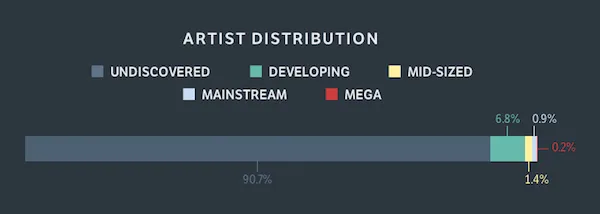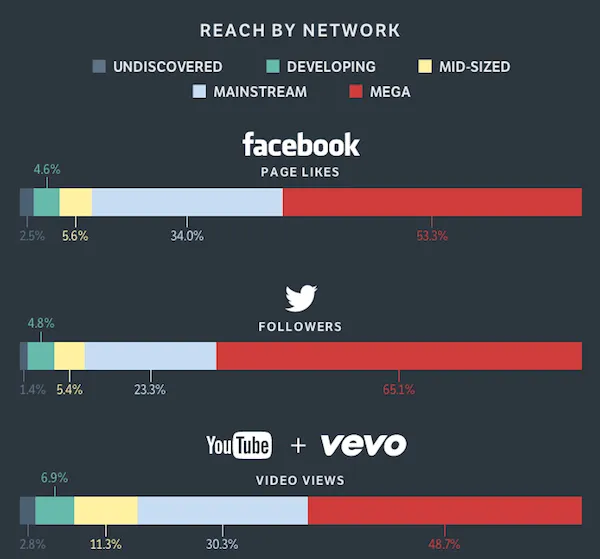How Many Musicians Are There In The World?
Not even taking into account that 91 Percent of all artists are completely undiscovered, simply because
there is no reliable way to measure the real size of the musician population in any one country.
What percentage of artists are even marginally successful in the industry?
I am a professional artist. As a painter, graphic designer, commission artist, art teacher, gallery curator,
most of my income comes from art activities. But I am relatively unknown, except to those few clients and
organizations, who through specific projects, support me. I am a professional artist, and the only way anyone
can track that is through a tax return, as "self-employed artist", which doesn't even have a classification
through government job search and employment services. Credit card companies also do not recognize artist
as a serious income status. Musicians are much the same, since they can be instrumentalists, songwriters,
producers, publishers, teachers, students, play in bands, do solo house concerts in personal venues, sing in
choirs, stage, theatre, opera, symphony, chamber music. You name it. Maybe even a DJ mix artist.
First one needs to define what we mean by "Musician" - Are we just talking about performers and recording artists,
or does the definition also include composers and songwriters? How about music teachers? Students and up and
coming musicians, ie. amateur and folk artists. Many musicians play multiple roles simultaneously (songwriter
+ recording artist + performer), but there are also creators who specialize in one role (composers who do not
perform, or performers who do not compose, for example) so the parameters are endless and complex.
Second, there’s an issue with how music creators define themselves. Professional, amateur, hobbyists, the
list goes on. As they say in the biz' "The beat goes on!". And are we speaking of living or dead? Regardless
of the artist, the music lives on in recordings. So where does it end? And how can we assess what is known,
let alone those we don't know who live under the radar? You can't even rely on commercial stats, because
the music industry doesn't include self-made talents, just as self-publishing in the book industry.
how do we define a “professional” musician? There are hundreds of thousands of people in this country who
enjoy writing songs, playing music, releasing recordings or uploading a self-made video once in a while.
Should it be based on workweek hours, career lifespan, music degrees, a minimum number of recording or composing
credits, education, income from music, label affiliation, union membership, or a combination of these things?
Number of musicians in the United States : https://futureofmusic.org/blog/2012/06/20/how-many-musicians-are-there
Take, for instance, the number of black musician who greatly influenced American music such as Prince, Bob Marley,
Miles Davis, Marvin Gaye, John Coltrane, Louis Armstrong, Stevie Wonder, Billy Holiday, Ray Charles, Whitney Houston,
Donna Summer, Aretha Franklin, Nat Kind Cole, James Brown, Ella Fitzgerald, Tina Turner, Robert Johnson, only to name a few.
The Following is a chart of the percentage the industry tracks of "commercially successful" artists.

With over 90.7 percent of artists considered ‘undiscovered’, turn that upside down, and you get these glaringly-lopsided
network reach stats:

https://www.digitalmusicnews.com/2014/01/17/nbs/
It kind of looks like the world financial distribution chart of the world's wealthy 1%, pumped up to look like
gross GDP, with 99% of the world left unaccounted for. So who are these unknown musicians? Well, you may be
one of them. You may play live locally and be known in your community, and not to the music industry.
So, support live music! Support your local artists! They are there to make us happy, we need them in our communities.
Maybe it's not all good, but human expression has many unappreciated qualities.
And fuck the music making machine, albeit, I do listen to a lot of it. As an audiophile, I've got more music
than I can listen to in a lifetime. The search is neverending...
.
there is no reliable way to measure the real size of the musician population in any one country.
What percentage of artists are even marginally successful in the industry?
I am a professional artist. As a painter, graphic designer, commission artist, art teacher, gallery curator,
most of my income comes from art activities. But I am relatively unknown, except to those few clients and
organizations, who through specific projects, support me. I am a professional artist, and the only way anyone
can track that is through a tax return, as "self-employed artist", which doesn't even have a classification
through government job search and employment services. Credit card companies also do not recognize artist
as a serious income status. Musicians are much the same, since they can be instrumentalists, songwriters,
producers, publishers, teachers, students, play in bands, do solo house concerts in personal venues, sing in
choirs, stage, theatre, opera, symphony, chamber music. You name it. Maybe even a DJ mix artist.
First one needs to define what we mean by "Musician" - Are we just talking about performers and recording artists,
or does the definition also include composers and songwriters? How about music teachers? Students and up and
coming musicians, ie. amateur and folk artists. Many musicians play multiple roles simultaneously (songwriter
+ recording artist + performer), but there are also creators who specialize in one role (composers who do not
perform, or performers who do not compose, for example) so the parameters are endless and complex.
Second, there’s an issue with how music creators define themselves. Professional, amateur, hobbyists, the
list goes on. As they say in the biz' "The beat goes on!". And are we speaking of living or dead? Regardless
of the artist, the music lives on in recordings. So where does it end? And how can we assess what is known,
let alone those we don't know who live under the radar? You can't even rely on commercial stats, because
the music industry doesn't include self-made talents, just as self-publishing in the book industry.
how do we define a “professional” musician? There are hundreds of thousands of people in this country who
enjoy writing songs, playing music, releasing recordings or uploading a self-made video once in a while.
Should it be based on workweek hours, career lifespan, music degrees, a minimum number of recording or composing
credits, education, income from music, label affiliation, union membership, or a combination of these things?
Number of musicians in the United States : https://futureofmusic.org/blog/2012/06/20/how-many-musicians-are-there
Take, for instance, the number of black musician who greatly influenced American music such as Prince, Bob Marley,
Miles Davis, Marvin Gaye, John Coltrane, Louis Armstrong, Stevie Wonder, Billy Holiday, Ray Charles, Whitney Houston,
Donna Summer, Aretha Franklin, Nat Kind Cole, James Brown, Ella Fitzgerald, Tina Turner, Robert Johnson, only to name a few.
The Following is a chart of the percentage the industry tracks of "commercially successful" artists.

With over 90.7 percent of artists considered ‘undiscovered’, turn that upside down, and you get these glaringly-lopsided
network reach stats:

https://www.digitalmusicnews.com/2014/01/17/nbs/
It kind of looks like the world financial distribution chart of the world's wealthy 1%, pumped up to look like
gross GDP, with 99% of the world left unaccounted for. So who are these unknown musicians? Well, you may be
one of them. You may play live locally and be known in your community, and not to the music industry.
So, support live music! Support your local artists! They are there to make us happy, we need them in our communities.
Maybe it's not all good, but human expression has many unappreciated qualities.
And fuck the music making machine, albeit, I do listen to a lot of it. As an audiophile, I've got more music
than I can listen to in a lifetime. The search is neverending...
.